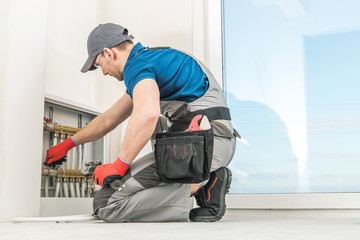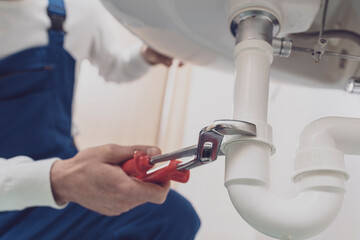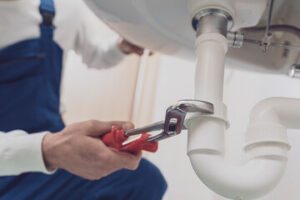Plumbing is a system of pipes and fixtures that deliver clean water and remove waste. It is also used to heat and cool fluids. Plumbers use various tools and skills to install, repair and maintain these systems. To learn more, Click Me.
 A plumbing blueprint shows the location of drains, water lines, and vent stacks. It also includes the size of the pipe and the number of fixtures.
A plumbing blueprint shows the location of drains, water lines, and vent stacks. It also includes the size of the pipe and the number of fixtures.
The plumbing system is one of the most important components of a home or building. It is responsible for distributing potable water and disposing of wastewater. It also controls the heating and cooling of a facility. It is essential for maintaining a healthy living environment. Without a properly functioning plumbing system, life would be difficult in any building or house.
The cost of plumbing services is typically based on the type of service and materials needed. For example, a plumber may charge a service call fee to diagnose a problem or provide an estimate. They may also charge a flat rate for routine maintenance, such as drain cleaning or toilet repair.
For major projects, such as repiping or installation of new fixtures, the price will vary depending on the materials used and how complex the job is. For instance, copper pipes are more expensive than plastic ones. A plumber may also have to pay for a permit if the work involves changing existing pipes or sewage lines.
Another factor to consider is the markup on plumbing supplies. Generally, plumbers apply a 10-35% markup on their supplies. This is to cover overhead costs and meet their profit margins. However, this can vary widely from area to area. It’s best to research the local market rates before setting your prices.
Plumbers must be licensed to install and maintain plumbing systems. The license process usually requires a combination of education, training, and experience. Some vocational schools offer free training for future plumbers, while others charge a fee to enroll. In addition to getting a license, plumbers should also obtain insurance to protect themselves against liability claims.
Plumbing is a broad field that includes water, gas, and other fluids. Its main functions are supplying water, removing waste, and heating and cooling facilities. In addition, it can be used for irrigation, water filtration, and even fire safety. Plumbing systems are regulated by local, state, and federal authorities. In order to comply with regulations, they must be installed and maintained correctly. This includes having the right materials and tools, paying permits, and undergoing inspections.
Warranty
A plumbing warranty protects the buyer against shoddy workmanship, materials or products. These warranties are usually based on the length of time that the work will be covered and can include a guarantee on parts. The warranty may be offered by the plumbing company or the manufacturer. Regardless of the type of warranty, it is important to read the fine print to understand what the coverage entails. A good plumber will be able to explain the details of a warranty in clear terms.
Home warranties are a great way to save money on repairs for your plumbing system. Most providers offer basic plumbing coverage in their plans, which cover components like toilets, bathtubs, showers and whirlpool motors. Some providers also offer a premium plan that includes additional systems, such as water heaters and sump pumps. Before choosing a provider, it is important to compare the prices of each plan and read sample contracts. It is also a good idea to ask questions and get clarification about any unclear areas.
Plumbing problems can be costly, and they often occur at the most inconvenient times. When they do, it is important to address them immediately to prevent further damage. This is especially true for issues that impact other parts of your home, such as drywall and carpet. If left unattended, plumbing issues can cause mold, mildew and wood rot. In addition, they can lead to electrical and other safety hazards. A plumbing warranty will help you save money on repairs and reduce your stress when dealing with these problems.
Generally, most plumbing issues are covered by home warranties, but some are not. For example, a plumbing warranty will not cover the cost of repair to a dishwasher or washer/dryer that is faulty due to normal wear and tear. It will also not cover a problem that is caused by regular use of the appliance, such as pouring grease or coffee grounds down the sink.
In order to qualify for a home warranty, you must have the required documentation and provide your contact information. In addition, you must sign a contract. Some companies offer a free trial period, which allows you to test their services and determine whether they are right for you. Once you have signed a contract, the company will send you a welcome kit with detailed instructions on how to submit a claim and access your service agreement.
Reputation
The reputation of a plumbing company is important for both new and existing clients. A positive online review helps build credibility, trust, and a good standing in the community. It also helps establish a competitive advantage in the industry. This reputation is vital for any plumbing business that wants to compete with local competitors and earn leads and convert them into customers.
However, it is not always easy to earn a positive reputation for your plumber’s services online. It is not uncommon for a dissatisfied customer to post a negative review on the internet. When this happens, potential customers will likely search for another plumbing company, and the reputation of the company can go down. This is why it is crucial for plumbers to focus on generating happy customers and encouraging them to share their experiences online.
In addition to helping boost your online reputation, client reviews can help you get more jobs. This is because potential customers will see that you have a lot of positive reviews and will be more inclined to call your company. When a prospective client reads a positive review, they will feel confident about hiring your company for their plumbing needs.
It is a best practice to respond to reviews, regardless of their star rating. This shows that you care about your clients and are willing to go the extra mile to make sure they are satisfied with your service. It is also a good way to build loyalty with your clients.
When responding to a negative review, be honest and polite. Try to explain what went wrong and offer a solution. If possible, encourage the customer to talk the issue over with you privately. This will make them less likely to blast your company in a public review later.
Reputation Management is a powerful digital marketing tool for plumbers, which enables them to collect and manage reviews across all major review sites. This allows plumbing companies to supercharge their online reputation and increase their visibility on Google searches. The platform provides a dashboard for displaying reviews, and also offers customization options such as selecting which types of reviews to display and who should receive notifications.
Experience
Plumbing is a vital trade that requires specialized knowledge of water and sewage systems. Plumbers install, repair and maintain these systems in residential and commercial buildings. They must also have strong mechanical skills and excellent customer service. In addition, they must be physically strong and able to work in cramped spaces. They must also be proficient with administrative tasks, such as scheduling consultations with clients, providing cost estimates, and preparing invoices.
Plumbers have many career opportunities and can choose from a variety of jobs. They can be self-employed by starting their own business, or they can become full-time employees for a company that offers them health insurance and other benefits. They can also choose to specialize in a certain area of plumbing, such as sewage systems, hot and cold water systems, or fire sprinklers.
Most plumbers begin their careers with on-the-job experience, and some go through a formal apprenticeship program or attend a vocational school to receive more in-depth training. Many of them also belong to a union, which can provide excellent benefits and pay. Some also earn additional certifications to increase their marketability and earning potential.
In addition to repairing and installing plumbing, plumbers must be knowledgeable about the code requirements for different types of construction projects. This ensures that the systems comply with local building codes and are safe for use by occupants. They may also be responsible for developing new plumbing technologies or methods. Plumbers who specialize in water supply systems are skilled at laying and maintaining water pipes, while those who focus on drainage systems are experts at clearing stormwater debris.
Plumbers also need to be highly motivated and able to work independently. They often spend a lot of time outdoors and work in small, dark places. They must be able to handle a variety of physical challenges, including working in extreme temperatures. They must also be able to communicate clearly with customers and supervisors. They should be able to answer questions about plumbing products and services, and they should be comfortable discussing issues with people of all ages.


 Residential plumbers install, repair, and maintain pipes that carry water, waste, gas, and steam in homes. They also work on plumbing fixtures, such as bathtubs, showers, sinks, and toilets. They may also install appliances with water line connections, like washing machines and refrigerators. They usually work on plumbing systems in new construction homes or home renovations.
Residential plumbers install, repair, and maintain pipes that carry water, waste, gas, and steam in homes. They also work on plumbing fixtures, such as bathtubs, showers, sinks, and toilets. They may also install appliances with water line connections, like washing machines and refrigerators. They usually work on plumbing systems in new construction homes or home renovations.